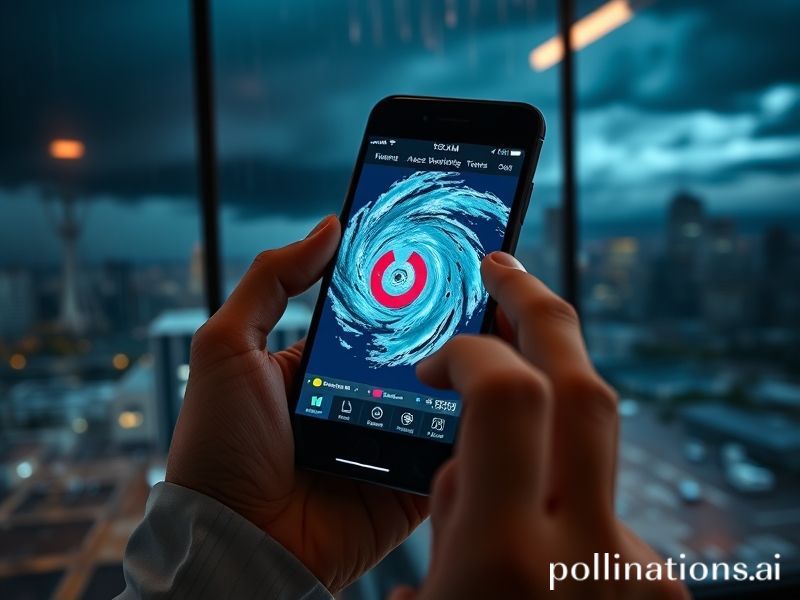Storm Inc.: How AccuWeather Turned the World’s Climate Anxiety into a Subscription Service
Storm Frontiers: How AccuWeather Quietly Re-Writes the Planet’s Mood Swings
(Dave’s Locker, International Desk)
PARIS—It’s 3:11 p.m. local time, and a push notification just informed a commuter on the RER B that a “life-threatening derecho” will flatten her picnic plans in twenty-three minutes. She sighs, deletes the brie from her online cart, and mutters something unprintable about American imperialism. The app in question? AccuWeather, the Pennsylvania-born oracle that has colonized every smartphone from Lagos to Lapland and turned the once-humble weather forecast into a geopolitical mood ring.
The numbers are almost endearing in their hubris: 1.5 billion monthly users, 100+ languages, and forecasts for 3.5 million locations—roughly one for every time someone has declared the death of the nation-state. While governments still argue about carbon quotas, AccuWeather has already monetized the very sky, selling hyper-local despair in 15-minute increments. Call it cloud computing in the most literal, and lucrative, sense.
Global South meteorological services—chronically underfunded, perennially ignored—now find themselves in the undignified position of citing a private American corporation during parliamentary briefings. When AccuWeather predicted that Cyclone Mocha would swerve into Bangladesh two weeks before Dhaka’s own department issued an alert, the minister of disaster management thanked “our friends in State College” on live television. The applause was polite; the subtext was colonial déjà vu with a doppler radar.
Meanwhile, European regulators—those indefatigable hall monitors of the digital playground—are investigating whether AccuWeather’s granular tracking of barometric pressure constitutes “sensitive personal data.” Imagine the scene in Brussels: bespectacled civil servants drafting 400-page impact studies on whether knowing a Strasbourg baker’s humidity levels violates the GDPR. Kafka has nothing on the cloud.
In the Gulf, where petrostates pray for rain like ironic performance art, AccuWeather’s premium tier is a status symbol. For the low-low price of $23.99 a year, Emirati influencers can receive minute-by-minute UV alerts while tanning on imported sand. Somewhere in the Empty Quarter, a camel squints at a dust storm and wonders why it didn’t get the push notification.
The company’s secret sauce is a proprietary blend of government satellite data (free), academic research (underfunded), and the same AI models that can’t reliably identify a cat but are apparently qualified to predict the trajectory of a Category 5. The result is a forecast so precise it can tell you exactly when to regret leaving the house, yet somehow still misses the part where your umbrella inverts and smacks a diplomat.
Climate change, ever the overachiever, has only sweetened AccuWeather’s business model. When the weather stops behaving like weather, people cling to any oracle promising certainty, even one headquartered next to a Sheetz convenience store. Shares of parent company AccuWeather Global, Inc. have risen 67 % since the first “heat dome” became a household phrase—proof that if you can’t fix the planet, you might as well sell tickets to the apocalypse.
Irony, of course, is the unpaid intern of history. The same algorithms warning Jakarta about rising sea levels are hosted on server farms guzzling electricity in coal-powered Virginia. Every push notification carries a carbon footprint; every “severe thunderstorm alert” is another small, pixelated cough at the atmosphere. But don’t worry—the company offsets this by planting a tree every time you share their app, which is the ecological equivalent of putting a Band-Aid on Vesuvius.
And yet, for all the snark, there’s something almost tender about a species so rattled by its own weather that it outsources the sky to an app. We used to read entrails; now we refresh radar loops. The auguries have merely traded guts for gigabytes.
So the next time your phone buzzes with a flash-flood warning in a city that used to be a desert, spare a thought for the grand, ridiculous theater of it all: humanity, armed with satellites and superstition, paying a subscription fee to be reminded that—surprise!—the world is ending, but only between 4:15 and 4:30 p.m. Bring an umbrella. Or don’t. AccuWeather already knows you’ll check again in five minutes anyway.







